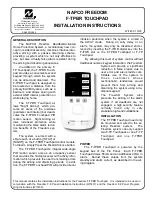
Service Modes, Error Codes, and Fault Finding
5.
5.
Service Modes, Error Codes, and Fault Finding
Index of this chapter:
5.1 Test Points
5.2 Service Modes
5.3 Service Tools
5.4 Error Codes
5.5 The Blinking LED Procedure
5.6 Fault Finding and Repair Tips
5.1
Test Points
In the chassis schematics and layout overviews, the test points
(Fxxx) are mentioned. In the schematics, test points are
indicated with a rectangular box around “Fxxx” or “Ixxx”, in the
layout overviews with a “half-moon” sign.
As most signals are digital, it will be difficult to measure
waveforms with a standard oscilloscope. Several key ICs are
capable of generating test patterns, which can be controlled via
ComPair. In this way it is possible to determine which part is
defective.
Perform measurements under the following conditions:
•
Service Default Mode.
•
Video: Color bar signal.
•
Audio: 3 kHz left, 1 kHz right.
5.2
Service Modes
Service Default mode (SDM) and Service Alignment Mode
(SAM) offers several features for the service technician, while
the Customer Service Mode (CSM) is used for communication
between the call centre and the customer.
This chassis also offers the option of using ComPair, a
hardware interface between a computer and the TV chassis. It
offers the possibilities of structured troubleshooting, error code
reading, and software version readout for all chassis.
Minimum requirements for ComPair:
a Pentium processor, a
Windows OS, and a CD-ROM drive (see also paragraph
"ComPair").
5.2.1
Service Default Mode (SDM)
Purpose
•
To create a predefined setting for measurements to be
made.
•
To override software protections.
•
To start the blinking LED procedure.
•
To inspect the error buffer.
•
To check the life timer.
Specifications
Table 5-1 SDM default settings
•
All picture settings at 50% (brightness, color contrast, hue).
•
Bass, treble, and balance at 50%; volume at 25%.
•
All service-unfriendly modes (if present) are disabled. The
service unfriendly modes are:
–
Timer / Sleep timer.
–
Child / parental lock.
–
Blue mute.
–
Hotel / hospital mode.
–
Auto shut off (when no “IDENT” video signal is
received for 15 minutes).
–
Skipping of non-favorite presets / channels.
–
Auto-storage of personal presets.
–
Auto user menu time-out.
–
Auto Volume Levelling (AVL).
How to Enter
To enter SDM, use one of the following methods:
•
Press the following key sequence on the remote control
transmitter: “
062596
” directly followed by the MENU button
(do not allow the display to time out between entries while
keying the sequence).
•
Short "Service" jumpers on the TV board during cold start
and apply mains (see Figure "Service jumpers"). Then
press the mains button (remove the short after start-up).
Caution
: Entering SDM by shorting "Service" jumpers will
override the +8V-protection. Do this only for a short period.
When doing this, the service-technician must know exactly
what he is doing, as it could damage the television set.
•
Or via ComPair.
Figure 5-1 Service jumpers
After entering SDM, the following screen is visible, with SDM in
the upper right corner of the screen to indicate that the
television is in Service Default Mode. See next paragraph
“Service Alignment Mode (SAM)” for an explanation.
Figure 5-2 SDM menu
Region
Freq. (MHz)
Default syst.
Europe (except France),
AP-PAL/-Multi
475.25
PAL B/G
France
SECAM L
NAFTA, AP-NTSC
61.25 (channel 3) NTSC M
LATAM
PAL M
F_15270_053.eps
180505
1
ERR 0 0 0 0 0
OP 000 057 140 0
3
2 120 12
8
000
F_15420_029.ep
s
070220
LLLLL AAAABCD X.YY/EEEEEE F.GG
S
DM












































